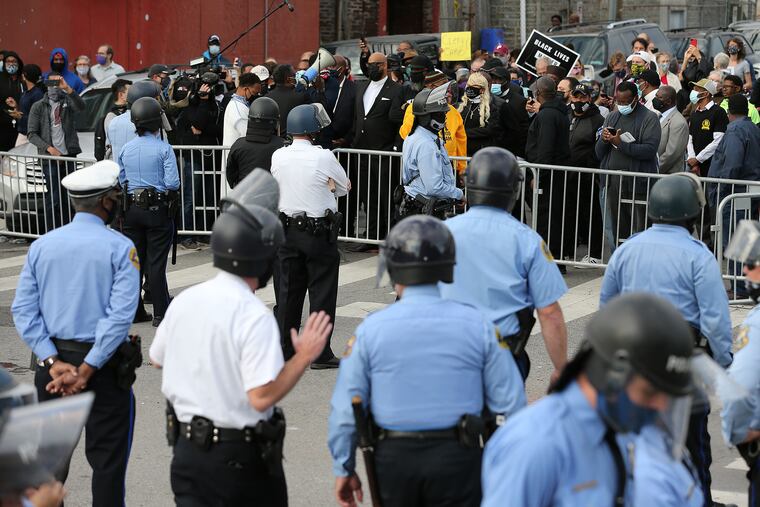I help people accused of crimes, but I still get accused — just for being Black | Opinion
Even with my training, connections, and experience, I was still detained in my own building by police.

A recent interaction with the police reminded me what it’s like to be Black in Philadelphia.
On Oct. 27, I was trying to enter my own apartment building, located in a rapidly gentrifying North Central Philadelphia neighborhood, when a police officer blocked my entrance to the main lobby. It’s a new building, and this was the day of its ribbon-cutting ceremony, so there were many residents and nonresidents walking around.
The officer asked, “Can I help you?” and I said, “No,” and that I lived in the building. I was wearing pajamas and slippers, looking like a person who was at home. Her response was a terse “Nobody lives here.” From there, I was asked to show ID, which I refused. (I don’t need to show ID to enter my home; it’s equivalent to a stranger on the street asking for it.) Ironically, about nine other well-dressed people were in the vestibule at the same time. All of them were white, and none of them were asked to validate their presence in the building.
There were about 10 other officers on site, and before long I was surrounded by three of them, including this officer’s supervisor, who ultimately instructed her to let me pass. Even when presented with this order, she continued to partially block the door, ensuring I had to turn my body sideways to squeeze past her to get to my own apartment building.
I wish I could say the story ends here, but even after entering the lobby (with my own security key fob, no less!), I was followed all the way to my apartment by the supervising officer, as other white, nonresidents who were there for the ribbon-cutting walked unescorted through the common areas of my apartment building. To his credit, he did apologize for the behavior of the lady officer and went on his way — but not before he was completely satisfied that my apartment was indeed my apartment.
As an employee of the Defender Association of Philadelphia, I’m fully aware that this encounter could have gotten much, much worse. The cell phones held by the well-dressed ribbon-cutting attendees discouraged the officers from creating an unnecessary scene. And as an organizer of some of the community education events sponsored by the Defender, my knowledge of the justice system enabled me to remain calm and confident, preventing an escalation.
But what about all the young Black men and women who don’t work at the Defender, who can’t immediately access the expertise and resources we provide for these situations? Even with my training, connections, and experience, I was still detained in my own building by police. Based solely on my appearance, a police officer literally placed herself between me and people who had less right to be there than me.
“But what about all the young Black men and women who don’t work at the Defender, who can’t immediately access the expertise and resources we provide for these situations?”
We have made some good progress; I was pleased to see Councilmember Isaiah Thomas’ “Driving Equality” bill become law. I’m proud of the important work our Police Accountability Unit did to provide the data that helped shape this important piece of legislation, which prohibits officers from pulling over a car for minor offenses such as expired tabs, or having something dangling from your rearview mirror. But my encounter with Philly police shows you don’t need to be in your car to be stopped, harassed, and detained.
I encourage everyone who reads this to visit the Defender Association’s website and to learn more about our training module Know Your Rights/Systems about how to navigate the justice system when accused, and Shop-Talks at local barbershops, where people can learn from justice experts. We also schedule community office hours, pop-up legal clinics, and other community programs to teach some of the ins and outs of the justice system, and help people who find themselves in a situation like mine.
Sadly, there’s no level of education, social standing, or qualification that protects us from a police culture that has criminalized our skin color. I’m hopeful that the “Driving Equality” bill will reduce a lot of the unnecessary interactions between Black people and police in Philly. But there needs to be a serious, concerted effort to root out the racist culture that teaches police officers that it’s OK to harass Black people at will.
Until that happens, whether it’s our cars or even our homes, there’s no truly safe place to be Black.
Guy Lang is a community outreach coordinator for the Children and Youth Justice Unit at the Defender Association of Philadelphia.